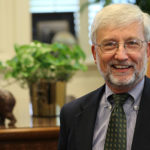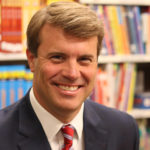WACO—Baylor University will comply with privacy laws that protect student records revealing immigration status, but it will not declare itself a “sanctuary campus,” Interim President David Garland said.
In a Feb. 20 open letter to the Baylor Family, Garland responded to a petition—drafted primarily by several doctoral students in the university’s religion department—asking Baylor to designate itself a sanctuary campus.
The online petition, which drew more than 1,300 signatures, asked Baylor to “refuse to comply with immigration investigations or deportations to the fullest extent possible, including denying access to university property.”
Sanctuary campus designation lacks ‘specific meaning’
In his open letter, Garland noted his belief the petitioners acted out of “a commendable spirit of compassion,” but he did not agree to declare Baylor a “sanctuary campus.”
 David Garland“While we appreciate the heart of those who have signed the petition, I believe we can continue to support and care for our students, faculty, staff and scholars without creating a designation, such as a ‘sanctuary campus,’ which has no specific meaning beyond what one assigns to it,” he said.
David Garland“While we appreciate the heart of those who have signed the petition, I believe we can continue to support and care for our students, faculty, staff and scholars without creating a designation, such as a ‘sanctuary campus,’ which has no specific meaning beyond what one assigns to it,” he said.
“That said, many of the concerns raised in the petition are issues for which Baylor already has policies and practices in place that are rigorously followed. For instance, Baylor is bound by the Federal Educational Rights and Privacy Act to protect the privacy of student education records; therefore, we have not and will not release information regarding a student’s immigration status to any enforcement agency without proper authorization or legal authority.”
At the same time, Garland added, “as a nonprofit institution of higher education chartered by the State of Texas, we also are bound to uphold all other federal and state laws.”
“Accordingly, it is not in the university’s best interests—nor in keeping with our legal covenants—to declare Baylor a ‘sanctuary campus’ without the proper authorization or legal authority,” he said.
Sign up for our weekly edition and get all our headlines in your inbox on Thursdays
Petitioners not satisfied with response
Graduate students involved in drafting the petition noted they trust Baylor’s leaders when they say the university is guided by long-held faith-based commitments, but they insisted “these commitments require a stronger response in the present climate, in the interest of protecting vulnerable students already attending Baylor.”
“The university administration’s lack of condemnation of the recent executive orders puts Baylor at odds not simply with the authors and signees of the petition, but with the broad-based Christian and interfaith criticism of these orders. We stand by our belief that the Christian tradition and Scripture speaks unequivocally on these matters,” a statement jointly issued by Tyler Davis, Thomas Breedlove, Tom Millay and Nicholas Krause said.
“It also remains unclear, given this response, what—if any—concrete procedures the university will use to protect its community members from immigration enforcement agencies. We maintain that the university administration’s initial response is not specific to the petition and its demands. In particular, we have requested and anticipate meeting with the administration to discuss expanding protections for its students. Moreover, we believe that Baylor’s best interest is the protection of its most vulnerable students.”
Baylor staff meets with international students
The Baylor community includes more than 800 international students and scholars from at least 70 countries, Garland noted.
Staff from the university’s Center for Global Engagement directly contacted students from nations included in President Trump’s Jan. 27 executive order on immigration and refugees, and the center held a Feb. 2 open meeting for all international students. Garland also invited students and scholars from the affected countries to a lunch meeting for further dialogue.
“While the executive order is still working its way through our nation’s legal system, we will continue to provide advice and support to our students and scholars whose lives may be directly impacted by it,” Garland said.














We seek to connect God’s story and God’s people around the world. To learn more about God’s story, click here.
Send comments and feedback to Eric Black, our editor. For comments to be published, please specify “letter to the editor.” Maximum length for publication is 300 words.